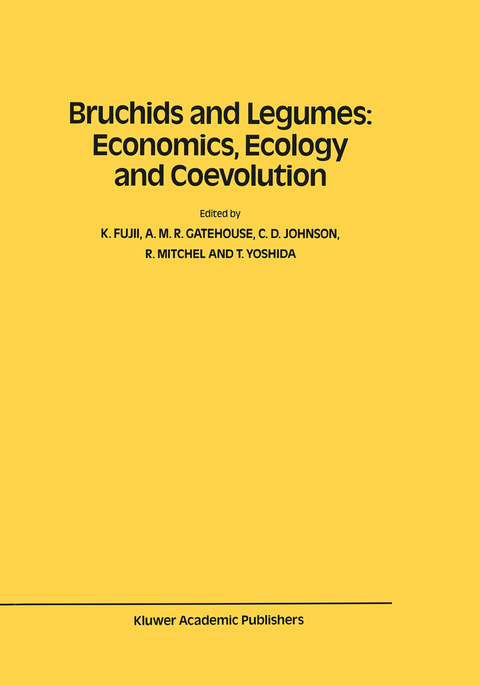
Bruchids and Legumes: Economics, Ecology and Coevolution
Springer (Verlag)
978-0-7923-0701-3 (ISBN)
In 1980, the International Symposium on the Ecology of Bruchids Attacking Legumes (Pulses), organized by Dr. Labeyrie, was held at Tours, France. Since then, there has been tremendous progress in the area of Bruchid and Legume research. At the same time, as we face the problems of world-wide population explosion and food shortage, the importance of legumes as the world's major protein source is rapidly increasing, especial ly in tropical regions. Thus, it seemed appropriate to hold the Second Symposium in order to review the recent progress in the control of Bruchids and in the biology and ecology of Bruchids and legumes. This is an important part of the search for ways to integrate these fields with a common perspective. The Second International Symposium on Bruchids and Legumes (ISBL-II) was held in September 6-9, 1989 at Okayama, Japan under the joint auspices of the Japanese Society of Applied Entomology and Zoology and of the Foundation for Advancement of International Science. Significant contributions have originated in Japan on the study of Bruchid and legumes. Most notably, the study on population ecology by Professor S.
Historical review of Bruchid studies in Japan.- 1. Biology and Control of Bruchid.- Biology.- Bionomics of Bruchidius incarnatus Boh. in Egypt.- Regulatation of autonomic physiological functions during reproductive diapause of Bruchus affinis.- Role of physical and chemical stimuli of legume host seeds in comparative oviposi-tional behaviour of Callosobruchus maculatus (Fab.) and C. chinensis (Linn.) (Coleoptera: Bruchidae).- Chemical ecology of Bruchids.- Control.- Some promising physical, botanical and chemical methods for the protection of some grain legumes against Bruchids in storage under Bangladesh conditions.- Carbon dioxide as a control agent for Callosobruchus maculatus (Fab.) in stored adzuki bean.- Effect of vegetable oils on the ovipositional behaviour of Callosobruchus maculatus (Fabricius).- Effect of five botanicals as protectants of greengram against the pulse beetle Callosobruchus maculates.- Insecticidal actions of several plants to Callosobruchus chinensis.- Insecticidal control of cowpea weevil, Callosobruchus maculatus F., a pest of mungbean.- Pea weevil (Bruchus pisorum L.) and crop loss — Implications for management.- Plant quarantine and fumigation of imported grain legumes in Japan.- 2. Life Cycle and Coevolution of Bruchid and Legume.- Taxonomic Feature and Life Cycle of Bruchidae.- New world Bruchidae: Past, present, future.- A synopsis of the Bruchid fauna of Japan.- Diversity in life cycle patterns of Bruchids occurring in Japan (Coleoptera: Bruchidae).- Life history of the azuki bean weevil, Callosobruchus chinensis (Coleoptera: Bruchidae), in the field.- Coevolution of Bruchid and Legume.- Biochemical adaptations by the bruchid beetle Caryedes brasiliensis.- Coevolutionary relations between Bruchids and their host plants. The influenceon the physiology of the insects.- Coevolution of Bruchidae and their hosts: Evidence, conjecture, and conclusions.- Breeding of Bruchid-resistant Legumes.- Systematics of the azuki bean group in the genus Vigna.- Cross compatibility and cytogenetical relationships among Asian Vigna species.- Genetics and breeding for Bruchid resistance in Asiatic Vigna species.- Breeding for Bruchid resistance in cowpea.- Bruchid resistance factors in Phaseolus and Vigna legumes.- Biochemical resistance to Bruchid attack in legume seeds; investigation and exploitation.- 3. Laboratory Population Ecology of Bruchids and their Parasites.- Bruchid Life History, Ecology, and Evolution.- Life histories of stored-products insects.- Biotype variation and host change in Bruchids: Causes and effects in the evolution of Bruchid pests.- Experimental character displacement in the Adzuki bean weevil, Callosobruchus chinensis.- Alternative life-histories in Callosobruchus maculatus: Environmental and genetic bases.- Behavioral Interaction.- Behavioral ecology of Callosobruchus maculates.- Sex-ratio determination in three wasp ectoparasitic on bean weevil larvae.- The mechanisms of contest and scramble competition in Bruchid species.- Adaptations of Callosobruchus species to competition.- Population Dynamics.- Comparison of the density-dependent population process between laboratory and wild strains of Callosobruchus chinensis (L.).- Population processes and dynamics of laboratory populations of Callosobruchus spp.- Simulation of Professor Utida’s classic experiment on an interaction between the azuki bean weevil and its parasitic wasp.- A list of the legumes treated in the book and in the Symposium (ISBL-II).
| Erscheint lt. Verlag | 30.4.1990 |
|---|---|
| Reihe/Serie | Series Entomologica ; 46 |
| Zusatzinfo | IX, 407 p. |
| Verlagsort | Dordrecht |
| Sprache | englisch |
| Maße | 178 x 254 mm |
| Themenwelt | Naturwissenschaften ► Biologie ► Evolution |
| Naturwissenschaften ► Biologie ► Zoologie | |
| Technik | |
| Weitere Fachgebiete ► Land- / Forstwirtschaft / Fischerei | |
| ISBN-10 | 0-7923-0701-1 / 0792307011 |
| ISBN-13 | 978-0-7923-0701-3 / 9780792307013 |
| Zustand | Neuware |
| Haben Sie eine Frage zum Produkt? |
aus dem Bereich


